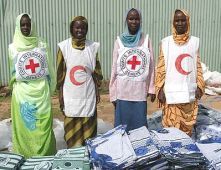ICRC resumes humanitarian work in Sudan’s Darfur
Feb 15, 2006 (KHARTOUM) — International Committee of the Red Cross (ICRC) said in a news bulletin published here that efforts continue to regain full access to people in need

transport equipment.
In late October 2005 the ICRC suspended its activities outside Al Geneina in West Darfur. Today, clashes continue in the area and the organization has not yet received convincing security guarantees for its field teams, although recent developments in Seleia have been encouraging. Also in West Darfur, the Jebel Mara area and the towns of Golo and Rokeiro in particular have recently witnessed heavy fighting and security conditions are so poor that no humanitarian organization is working there. The ICRC is still reviewing the possibility of resuming is activities in this area, where it believes it is urgent to assess needs.
The ICRC’s purpose in Darfur has always been to respond to the needs of
both the displaced and the resident populations in remote and rural areas.
To this end, it is working tirelessly with all the parties to the conflict
to obtain the security guarantees it requires to carry out its activities.
Assistance gets through to Gereida
On 7 February, after waiting for more than three weeks in the South Darfur
state capital Nyala, an ICRC convoy managed to reach the town of Gereida
with food and other essential items for 80,000 displaced people living in
camps. More convoys should soon return to Gereida to replenish the food
stocks in ICRC warehouses, which were running dangerously low.
Since early January, the ICRC had been unable to use the roads to the east
or south of Nyala because of the upsurge in the fighting. The Gereida
convoy finally got through after security guarantees had been received from
the parties to the conflict. Clashes have continued around Gereida in
recent weeks, displacing a further 10,000 people.
Large numbers of people have also been reportedly uprooted in the area of
Mershing, north of Nyala on the road to Al Fashir, and displaced to
neighbouring villages where their needs are being assessed by other aid
agencies.
In Seleia, north of Al Geneina, food was distributed in early February for
the first time in many months. After a serious security incident in
November 2005, the entire ICRC team had been pulled back from Seleia to its
base in Al Geneina. Local ICRC staff have now succeeded in reaching Seleia
and have distributed food to 3,000 people in a camp for displaced people on
the outskirts of the town. The ICRC is in permanent contact with the health
clinic it supports in Seleia and continues to supply it from Al Geneina.
For the time being, only locally recruited ICRC staff are permanently
working in Seleia.
Field surgical team
Over the past three weeks the ICRC’s field surgical team has been kept busy
providing treatment for 35 patients in Gereida (South Darfur), Golul (Jebel
Marra) and Teberat (south of Kabkabyia). In cooperation with the Finnish
Red Cross it also held a five-day workshop on war-surgery techniques for 14
junior doctors and 60 nurses in Nyala. Training of staff, under the
auspices of the Finnish Red Cross, will continue to be a major priority at
Nyala Teaching Hospital. A second war-surgery workshop is currently being
held for 25 doctors in Al Geneina.
Families reunited and more detainees released
The ICRC succeeded in reuniting two boys from Chad with their families in
Sudan on 4 February, one year after the first Red Cross message was sent
off to trace the boys’ families. In view of the instability along the
Chad-Sudan border, the boys were taken to the Chadian capital N’Djamena and
from there to their families via Khartoum.
On 2 February the Sudan Liberation Army released 21 detainees under ICRC
auspices in North Darfur. The ICRC transported the former detainees to the
state capital Al Fashir, where they were handed over to the local
authorities.
Protecting the civilian population
ICRC delegates deployed in the field document abuses affecting civilians
and other non-combatants. The ICRC makes direct representations to the
parties concerned with a view to preventing the recurrence of abuses and
minimizing their effects. It also carries out food, health, water and
sanitation programmes designed to improve the protection and security of
beneficiaries, especially in remote rural areas.
(ST)
